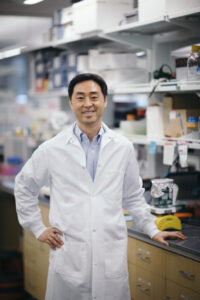“Our confidence in data generated by our in vivo studies with T3 Labs cannot be greater.” – Dr. Hee Cheol Cho
The Preclinical Challenge
Dr. Hee Cheol Cho and his team needed sufficient feasibility data from physiologically appropriate preclinical studies to pursue public funding opportunities to complete their translational research for a life changing biological pacemaker.
Dr. Cho is a stem cell/cardiology researcher. Cho joined the Wallace H Coulter Department of Biomedical Engineering at Georgia Tech and Emory, and Emory-Children’s Pediatric Research Center. He and his team develop gene-and cell-based therapies for cardiac arrhythmias.
“Designing and managing the logistic demands of a large in vivo study is immensely complex and requires much more knowledge than a bench scientist’s,” he said. “That’s where the team at T3 Labs has been exceptional. They fill in all of the translational gaps for our requirements with very high levels of proficiency. The ability to execute cardiac cath lab preclinical programs combined with electrophysiology is exceedingly rare. T3 Labs has the infrastructure and expertise to make it happen.
“The ability to conduct mechanical and translational studies in small and large models in the same location with a highly qualified preclinical staff who understand our needs and our science was the final piece of the puzzle. I distinctly remember flying out of Hartsfield-Jackson [after my second visit] knowing that this is the place.
“Whenever I need a letter of support, GCMI/T3 Labs has been ‘right on the dot.’ As scientists we forget deadlines and stop breathing 24 hours in advance. When you have to have it right then and there, the T3 Labs team does everything in their power to make it happen. That is not a small thing in preclinical capability and support.”
Editor’s note: T3 Labs became a wholly owned subsidiary of the Global Center for Medical Innovation (GCMI), a Georgia Tech non-profit affiliate, in 2016.
The Results: “Our confidence in the data cannot be higher.”
Can a biological pacemaker pace the heart? To answer the question T3 Labs measured heart rate data in a large animal model 24/7 for four straight weeks to understand if the technology can pace the heart. To do so, they artificially lowered the subject’s heart rate, creating the heart condition the technology seeks to impact. The pacemaker cells remained, but surgeons burned the bridge between the chambers of the heart, then the team delivered the mRNA based genetic therapy.
The preclinical evidence and data suggests the technology cannot only create heart rate function, but it may well generate better clinical outcomes, activity rates and blood pressure levels.
From quality data, continuing translational funding

0063001-17SN
2017_06_30: Environmental Portrait of Hee Cheol Cho and his staff working at a lab in the Health Sciences Research Building on the Emory University Campus in Atlanta, GA. Stephen Nowland/Emory University
“Our confidence in data generated by our in vivo studies with T3 Labs cannot be greater,” Dr. Cho said. “The quality of the data is very clean and a painstaking review of the 30 day ECG data by two cardiologists have ensured we were not, or are not, counting false positives or losing any false negatives. The quality control and confidence in the data cannot be greater because those cardiologists reviewed the data bit by bit. It took seven months.”
The project has since secured four grants in the past 12 months including $4.5 million from the Department of Defense, which will fund most of the IND enabling studies needed for FDA approval and first in human trials. Those studies will range from three months to up to one year for full spectrum of function.
The American Heart Association and Children’s Heart Foundation has provided $300,000 in funding for three years given the project’s significance in terms of patient need. The National Institutes for Health has granted the project $1.8 million for next four years which activates in spring 2021, for heart rate control with bioengineered pacemaker.
“I was compelled by a sense of duty to push our technology closer to the bedside,” Dr. Cho said. “Are we actually achieving synchronization? That’s just one of the many questions our continuing translational research seeks to answer.”
Read our full spotlight on Dr. Cho’s groundbreaking research here.
If you are interested in learning more about our preclinical facility, team, capabilities and resources, email info@t3labs.org. We’ll get you connected to the right member of the team.
